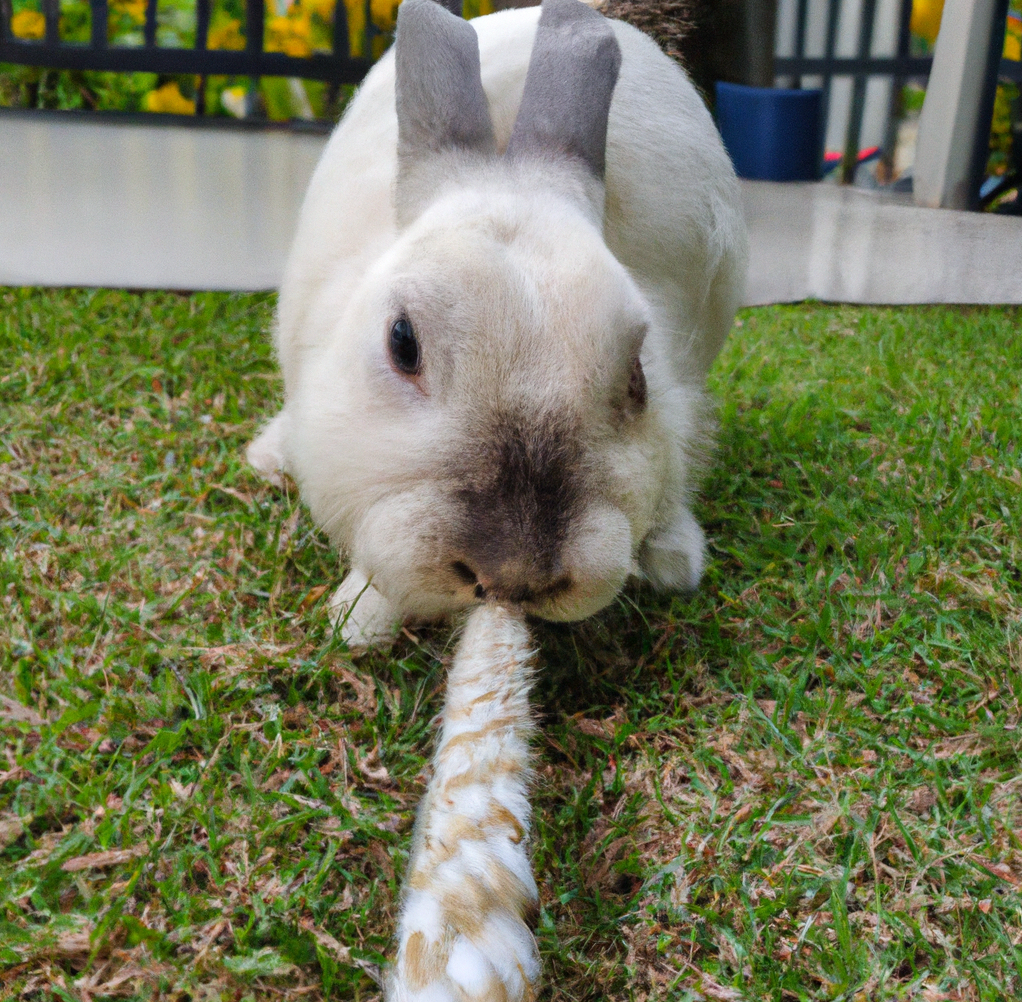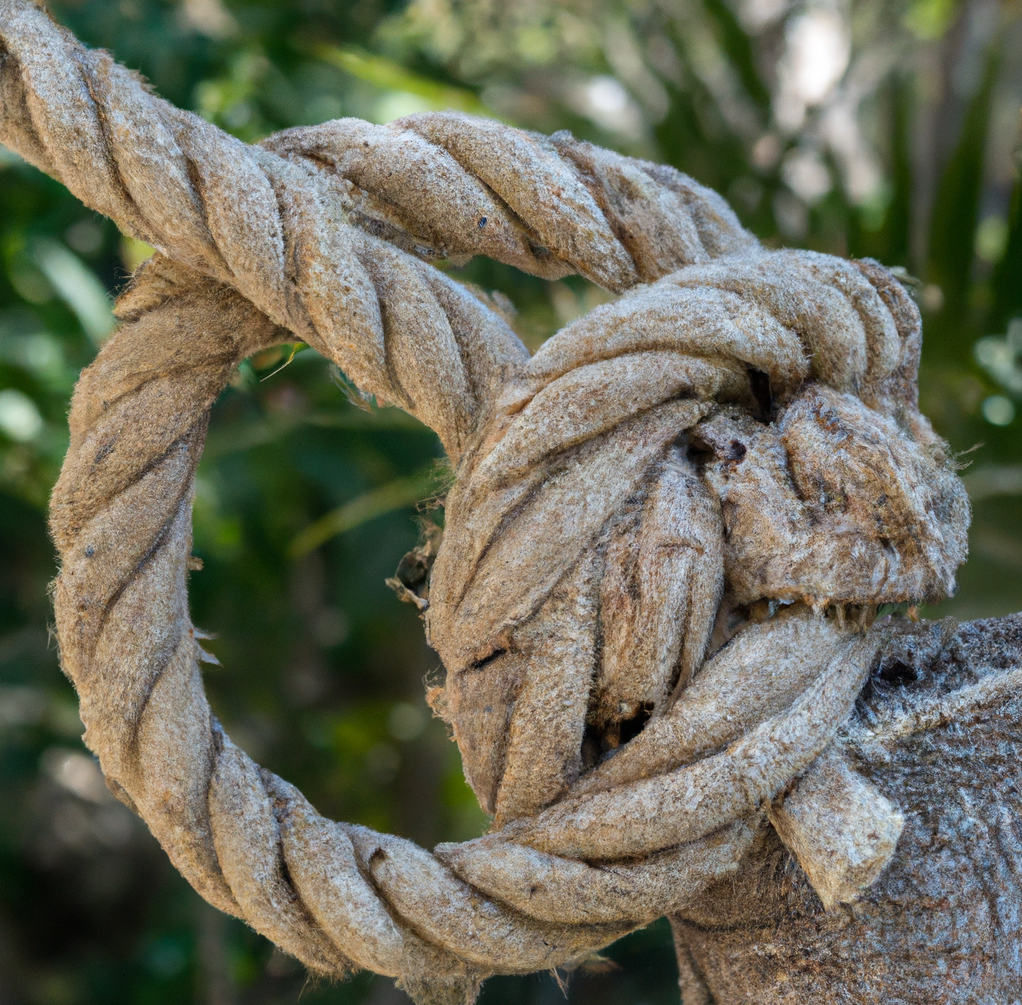Rabbits are popular pets and are loved by many for their cute and furry personalities. As such, it is important to provide them with a safe and comfortable living environment. This includes making sure that the materials you use to build and decorate their habitat, such as rope, are safe and non-toxic. This article will discuss the types of rope that are safe for rabbits, including jute twine, sisal, and hemp. We will go over the differences between each type of rope and why each is suitable for use with rabbits. We will also provide tips on how to safely use the rope to create a safe and comfortable home for your rabbit.
Exploring the Different Types of Rope That Are Safe for Rabbits: Jute Twine, Sissal, and Hemp
Rope is a versatile material that can be used for a variety of purposes, from construction and repair to playtime for pets. When it comes to rabbits, it is important to choose a type of rope that is safe and comfortable for them. In this article, we will explore three types of rope that are safe to use for rabbits: jute twine, sisal, and hemp.
Jute twine is a strong and durable material often used for crafts and gardening. It is made from the plant fibers of the jute plant, which is found in India and Bangladesh. Jute twine is soft and non-abrasive, making it an ideal choice for rabbits. It is also biodegradable, so it can be easily disposed of once it has been used.
Sisal is another popular choice for rope toys. This material is made from the leaves of the agave plant, which is found in Mexico, Africa, and Central America. Sisal is strong and durable, making it an ideal choice for rabbits. It is also resistant to mold and mildew, making it an excellent choice for use in damp areas.
Finally, hemp is an increasingly popular choice for rope toys. Hemp is a sustainable material made from the fibers of the cannabis plant. It is strong and durable, making it perfect for rabbits. It is also eco-friendly and biodegradable, so it can be easily disposed of once it has been used.
Overall, jute twine, sisal, and hemp are all great choices for rope toys for rabbits. They are strong and durable, making them perfect for playtime. They are also non-abrasive and biodegradable, making them safe and comfortable for your pet. With these three rope materials, you can ensure your rabbit has plenty of fun and safe playtime.
How to Choose the Right Type of Rope for Your Rabbit: Exploring Jute Twine, Sissal, and Hemp
Rabbits can be a great addition to any home, with their playful personalities and friendly dispositions. When it comes to providing your rabbit with a safe and secure environment, it is important to choose the right type of rope to build and maintain their enclosure. There are three main types of rope commonly used for rabbits: jute twine, sissal, and hemp. This article will explore the differences between these materials to help you make an informed decision about which type of rope is best for you and your rabbit.
Jute twine is a natural fiber rope made from the jute plant. It is a lightweight and durable material, making it a great option for enclosures. It is also resistant to UV radiation, so it won’t break down over time due to sun exposure. However, jute twine does not have the same strength and durability as sissal or hemp.
Sissal is a natural fiber rope made from plant fibers. It is a strong and durable material that is resistant to abrasion and UV radiation. It is an excellent choice for enclosures because it is also flexible and easy to work with. The downside to sissal is that it is more expensive than jute twine or hemp.
Hemp is a strong, durable material made from the hemp plant. It is resistant to UV radiation and abrasion, making it a great choice for enclosures. Hemp is also relatively inexpensive and easy to work with. However, hemp can be more difficult to find than jute twine or sissal.
When it comes to choosing the right type of rope for your rabbit enclosure, it is important to consider the material’s strength, durability, and cost. Jute twine is lightweight and durable, but not as strong as sissal or hemp. Sissal is strong and durable, but more expensive. Hemp is strong and inexpensive, but can be difficult to find. Each material has its own advantages and disadvantages, so it is important to weigh the pros and cons before making your decision.
The Pros and Cons of Each Type of Safe Rope for Rabbits: Jute Twine, Sissal, and Hemp

Jute Twine
Pros: Jute twine is an economical option for constructing a safe rope for rabbits. It is also a natural fiber, making it a sustainable choice. Additionally, jute twine is strong, durable, and rot-resistant, making it a good long-term choice.
Cons: Jute twine can be abrasive and may cause discomfort to a rabbit’s delicate skin. Additionally, it is not as soft and flexible as other types of rope, which makes it more difficult to handle and manipulate.
Sissal
Pros: Sissal rope is a popular choice for use with rabbits as it is soft, flexible, and gentle on the skin. Additionally, it is very strong, durable, and resistant to wear and tear.
Cons: Sissal rope is more expensive than other types of rope, making it a less economical option. Additionally, it is not as strong or durable as jute twine, so it may need to be replaced more frequently.
Hemp
Pros: Hemp rope is a great choice for rabbits as it is soft and flexible, making it comfortable for them to use. Additionally, hemp is very strong and durable, so it will last a long time.
Cons: Hemp rope can be expensive, making it a less economical option. Additionally, hemp rope can be difficult to find in some areas.
Learn the Basics of Rope Safety for Rabbits: Jute Twine, Sissal, and Hemp
Rope safety for rabbits is an important topic that should be considered by all rabbit owners. There are three types of rope commonly used for rabbits: jute twine, sisal, and hemp. Each type of rope has its own unique advantages and drawbacks. This article will provide an overview of the basics of rope safety for rabbits and explain the differences between jute twine, sisal, and hemp.
Jute twine is a lightweight, natural fiber twine that is commonly used for rabbit toys. It is also a good choice for leash training and is gentle on the rabbit’s skin. However, jute twine can stretch and break easily, so it is important to check it regularly for wear and tear.
Sisal rope is a strong, natural fiber rope that is often used for rabbit toys. It is more durable than jute twine and is less likely to stretch or break. However, sisal rope can be abrasive and may cause skin irritation. Therefore, it is important to make sure the rope is not too tight and to check the rabbit’s skin regularly for signs of irritation.
Hemp rope is a strong, durable rope that is often used for rabbit toys. It is less likely to stretch or break than jute twine or sisal rope. However, hemp rope can be abrasive and can cause skin irritation. Therefore, it is important to make sure the rope is not too tight and to check the rabbit’s skin regularly for signs of irritation.
In conclusion, it is important for rabbit owners to consider the safety of their pet when selecting a rope. Jute twine, sisal, and hemp are all suitable choices for rope toys and training tools, but it is important to check the rope regularly for signs of wear and tear and to look out for skin irritation. By following these basic safety tips, rabbit owners can ensure their pet’s safety and comfort.
Safety First: Understanding the Different Types of Rope for Rabbits, Including Jute Twine, Sissal, and Hemp
Rabbits can make delightful pets, and providing them with a safe and comfortable environment is essential. One important way to do this is understanding the different types of rope available to use as bedding and for other purposes. Knowing the advantages and disadvantages of each type of rope can help you make an informed decision when selecting the best type of rope for your pet.
Jute twine is a type of natural fiber rope composed of twisted jute fibers. It is often used to make burlap and hessian material, and is also used for packaging and agricultural purposes. Jute twine is strong and durable, making it a popular choice for rabbit bedding. Jute twine is also relatively inexpensive, but can be rough and can cause skin irritation.
Sisal is a type of rope made from the agave plant. It is strong and durable, making it a popular choice for rabbit bedding. Sisal is also relatively inexpensive and does not cause skin irritation. However, sisal tends to break down over time and can become dusty, making it less suitable for long-term use.
Hemp is a type of rope made from the stems of the cannabis plant. It is strong and durable, making it a popular choice for rabbit bedding. Hemp is more expensive than jute twine or sisal, but is softer and less likely to cause skin irritation. Hemp also breaks down slowly over time, making it a more suitable choice for long-term use.
When selecting the right type of rope for your rabbit, it is important to consider factors such as cost, durability, and skin irritation. Knowing the advantages and disadvantages of each type of rope can help you make an informed decision and provide your pet with a safe and comfortable environment.
Protecting Your Rabbit from Injury: Understanding the Different Types of Safe Rope, Including Jute Twine, Sissal, and Hemp

Rabbits are highly active animals and love to explore their environment. If you own a rabbit, you may want to create a play area for them to roam and explore, and it is important to ensure that your rabbit is safe while they are playing. One way to ensure safety is by using different types of safe rope.
Jute twine is a thin, soft rope that is often used for craft projects, but it is also safe enough to use for your rabbit’s play area. This type of rope is strong and durable, but not too harsh or abrasive, so it is ideal for rabbits to play with.
Sisal is another type of safe rope that is often used in making rugs. It is strong and durable, but it is not as abrasive as jute twine. It is also a natural material, so it is safe for your rabbit to play with.
Hemp rope is another option that is often used in making pet toys. It is durable and strong, but it is not as abrasive as sisal or jute twine. It is a natural material, so it is safe for your rabbit to play with.
When creating a play area for your rabbit, it is important to make sure that the rope you use is safe for your rabbit. Jute twine, sisal, and hemp are all safe options that will provide your rabbit with hours of entertainment without the risk of injury. With the right safety precautions, your rabbit can explore their environment without any worries.
Conclusion
In conclusion, jute twine, sissal, and hemp are all safe materials to use for rope when handling and exercising rabbits. These materials are strong and durable, and can handle the rabbit’s natural movements and behaviors without breaking. In addition, these materials are also safe for the rabbit to chew on, eliminating the risk of ingestion of toxic materials. Therefore, jute twine, sissal, and hemp are excellent choices for making rope that can be used when handling and exercising rabbits.

